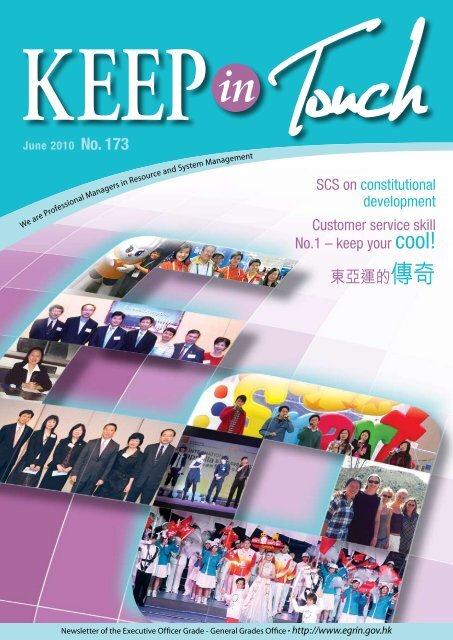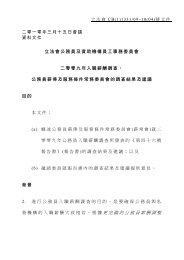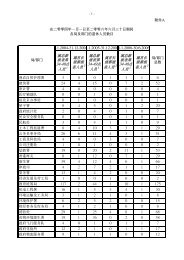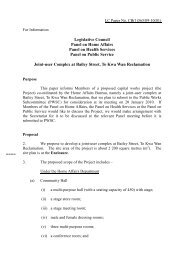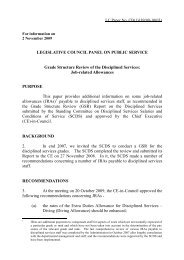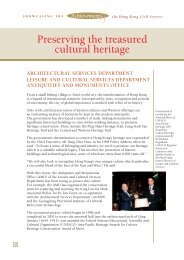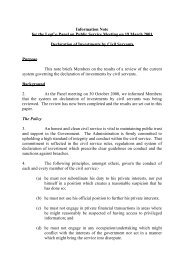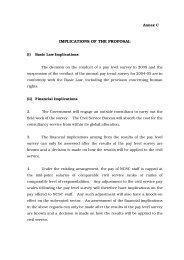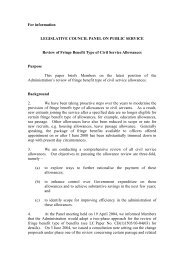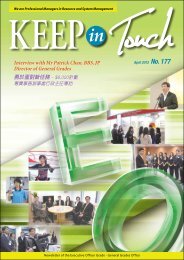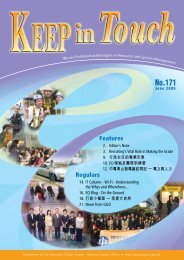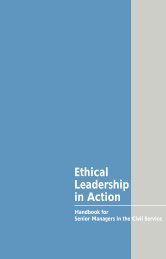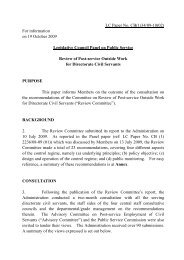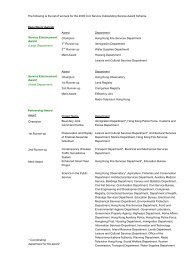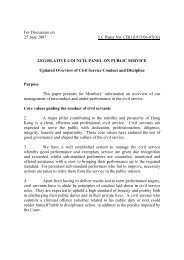Customer service - 公務員事務局
Customer service - 公務員事務局
Customer service - 公務員事務局
Create successful ePaper yourself
Turn your PDF publications into a flip-book with our unique Google optimized e-Paper software.
2<br />
I am most delighted to take up my appointment<br />
as SPEO(G) and look forward to overcoming the<br />
challenges it brings. After five years as District<br />
Officer (DO) (Sai Kung) I am perhaps a bit outof-touch<br />
with mainstream EO jobs, particularly<br />
human resource and grade management tasks.<br />
Nevertheless, I believe my extensive district<br />
experience will be valuable in discharging my new<br />
duties in managing the Executive Grade.<br />
Therefore, let me share with you relevant aspects<br />
of my DO job that shed light on a wide spectrum<br />
of tasks and responsibilities, and which I trust will<br />
inspire EO colleagues in performing their duties<br />
under different portfolios.<br />
When I assumed my DO post in November 2004,<br />
I felt this was really a big challenge since I did not<br />
consider my personality would fit in well with such<br />
a high profile job. But, being a General Grade<br />
officer subject to posting and deployment, I of<br />
course took a positive attitude and accepted my<br />
‘fate’. I did not have a gentle learning curve and it<br />
took some time for me to understand the intricacies<br />
of my job, get to know how to establish effective<br />
communication with local community leaders<br />
and cultivate good working relationships with my<br />
Government counterparts in the district.<br />
With hindsight, I think it was good for me to be<br />
aware of my own strengths and weaknesses at the<br />
outset so I could leverage on my strong points and<br />
stay alert to areas where I do not deliver so well.<br />
I believe many EO colleagues may face the same<br />
situation when taking up new jobs during their<br />
careers. Early on I decided to strengthen districtbased<br />
governance to meet the rising expectations<br />
of the district community. This involved putting in<br />
place a stronger and more effective network with<br />
departments providing local frontline <strong>service</strong>s.<br />
It also entailed advocating vigorously the “joined-up<br />
government” concept at the district level.<br />
With the DO taking ownership of key district<br />
co-ordination tasks and proactively changing the<br />
mindset of departmental colleagues, I believe<br />
we successfully engendered a better district<br />
governance culture.<br />
An unforgettable experience was crisis management<br />
during the swine flu pandemic in May last year<br />
when the Lady MacLehose Holiday Village<br />
became an emergency quarantine station.<br />
I became ‘Station Commander’ to ensure the best<br />
possible assistance was rendered to hundreds<br />
of involuntary guests under quarantine. Our EO<br />
colleagues in HAD displayed professionalism,<br />
perseverance and versatility in manning the<br />
Government help desk, and their assistance to the<br />
many compulsory and therefore annoyed guests<br />
made a considerable contribution to the success<br />
of the overall operation.<br />
For colleagues involved in similar emergencies in<br />
future, my experience may provide some useful<br />
reference pointers, particularly the need to:<br />
■ respond to the community’s ever-changing<br />
aspirations and review operations from time<br />
to time to re-position ourselves to better meet<br />
these changing needs;
■ have a firmer grasp of the community pulse and<br />
sentiments of key stakeholders to enhance our<br />
capacity for more effective governance; and<br />
■ secure wider and stronger community support<br />
for Government policies and initiatives.<br />
Since recruitment resumed in 2007 we have<br />
recruited some 600 EOsII, and this year’s intake<br />
will be around 150. Apart from natural wastage<br />
and replacement of NCSC staff, quite a number of<br />
long-term and time-limited EO posts are created<br />
each year. We take pride in this since there is<br />
still great demand for new EO posts to support<br />
various new policy initiatives, project and scheme<br />
administration, plus organising special events.<br />
Over the years we have seen many changes<br />
in duties and responsibilities plus necessary<br />
growth into new fields, many of them requiring<br />
still further EO staffing. Officers sent to these<br />
posts have always displayed versatility and<br />
resilience in capably fulfilling such new duties as<br />
event management, project administration, crisis<br />
management and tobacco control work.<br />
At times of crisis such as SARS in 2003 and last<br />
year’s swine flu pandemic our EO colleagues<br />
did a marvellous job in supporting operations<br />
at quarantine centres. They worked prolonged<br />
hours day and night, patiently doing their best to<br />
help those people forced into quarantine, hence<br />
facilitating the Administration in safeguarding public<br />
health. We all took great pride of their exemplary<br />
performance and I am sure their efforts reinforced<br />
the Executive Grade’s role as the backbone of the<br />
Civil Service besides fully reinforcing our treasured<br />
“can-do” core value.<br />
We should never fear that such emergencies<br />
would unreasonably overload our colleagues.<br />
To the contrary, the positive response of our EO<br />
colleagues to crisis situations and new areas of<br />
work is greatly appreciated by the Administration.<br />
The collaborative endeavours of our colleagues<br />
have together engendered a highly esteemed<br />
and trusted <strong>service</strong> culture that makes us the<br />
cornerstone of the Civil Service. The future<br />
development and progression of the Executive<br />
Grade will certainly hinge upon the continued<br />
support of our Grade members.<br />
The CDM Scheme for the Executive Grade is<br />
operating well. As human resources are any<br />
organisation’s most valuable asset, it is necessary<br />
to enhance the development of individual Grade<br />
members to better equip them for future job<br />
challenges while affording them reasonable career<br />
progression opportunities. We are also mindful<br />
of the need for well-conceived staff succession<br />
planning to ensure that we can maintain the<br />
necessary staff complement at various levels to<br />
cater for the needs of bureaux and departments.<br />
In gist, we shall focus on a total staff development<br />
approach for individual Grade members throughout<br />
their careers. Besides carefully nurturing the<br />
integration of new EOsII, we shall maintain a<br />
vigorous posting policy to widen job exposure<br />
and test an officer’s versatility and competence<br />
in different job settings, provide on-the-job and<br />
refresher training, and offer Mainland and overseas<br />
training for potential officers at senior ranks.<br />
We hope this total staff development approach will<br />
afford a holistic way of equipping our colleagues<br />
to meet their work challenges at various stages<br />
of their career as well as to facilitate a sustained<br />
development of the Executive Grade. Let’s make<br />
our best joint endeavours to further enhance<br />
our contribution to the Civil Service and the<br />
community at large.<br />
Peter Chan<br />
3
Secretary for the Civil Service<br />
on constitutional development<br />
On April 14, 2010, the Hong Kong Special Administrative Region (HKSAR) Government<br />
announced a package of proposals on the methods for selecting the Chief Executive (CE) and<br />
for forming the Legislative Council (LegCo) in 2012. Hong Kong’s constitutional development<br />
has reached a crucial stage.<br />
The Central Authorities and the HKSAR Government are fully committed to promoting<br />
Hong Kong’s democratic development. The proposed package is based firmly on the Basic Law<br />
and the 2007 decision of the Standing Committee of the National People's Congress (NPCSC),<br />
and the Government has taken full account of the views and suggestions expressed during the<br />
consultation period.<br />
The proposed package will enhance the democratic elements of the electoral methods for the CE<br />
and the LegCo through the participation of elected District Council members who have a broad<br />
electorate base. For the LegCo election, in particular, no more “traditional” functional constituency<br />
seat will be created; and 41 seats (close to 60% of all seats) will be returned through direct or<br />
indirect geographical elections.<br />
The proposed package has responded positively to the aspirations of some LegCo members<br />
who vetoed the 2005 proposal by attaining a clear universal suffrage timetable and proposing<br />
that only elected District Council members will participate in the election of District Council seats<br />
in the Election Committee and LegCo. Under the framework of the NPCSC decision, we have<br />
already maximised the latitude for enhancing the democratic elements of the two elections in<br />
2012 and paved the way towards universal suffrage.<br />
Passage of the proposed package will bring about a major step forward towards universal<br />
suffrage in Hong Kong’s constitutional development:<br />
• A clear timetable for universal suffrage: Hong Kong may implement universal suffrage for<br />
the election of the CE in 2017 and the LegCo in 2020. This is an important milestone for<br />
Hong Kong’s constitutional development.<br />
5
6<br />
• Mr Qiao Xiaoyang, Deputy Secretary-General of the NPCSC, made clear on the<br />
day we released the proposed package that the authority and legal effect of the<br />
universal suffrage timetable is beyond any doubt. The green light for universal suffrage has<br />
been switched on; and universal suffrage will be achieved after going through the<br />
“five steps”.<br />
• The HKSAR Government has made clear that the universal suffrage models to be<br />
implemented in future must comply with the Basic Law and the principles of universality<br />
and equality.<br />
• On the issue of how the functional constituencies should be dealt with when universal suffrage<br />
for the election of the LegCo is implemented, although the current-term HKSAR Government<br />
has only been authorised by the NPCSC to deal with the two electoral methods in 2012,<br />
we have already put on record the different proposals put forth recently within the community,<br />
and recommend that the next-term HKSAR Government follow up actively and consider the<br />
relevant proposals seriously.<br />
Constitutional development is a complicated issue. In a pluralistic society like Hong Kong,<br />
it is only natural for different sectors in the community to have different aspirations and to<br />
have different views on how to further democratise the electoral system. What is<br />
important is to forge a consensus acceptable to most people in a spirit of pragmatism and<br />
consensus-building.<br />
Results of surveys conducted by different academic and community organisations show that<br />
about 50-60% respondents support passage of the proposed package. The Government<br />
will continue to strive to gain the support of the community and the LegCo for this<br />
proposed package.<br />
In the face of challenges from all fronts, the Administration is committed to maintaining an<br />
apolitical, professional and career civil <strong>service</strong>. Civil servants are the backbone of the HKSAR<br />
Government. All civil servant colleagues must give their best to serve the CE and the Government<br />
of the day in formulating, explaining and implementing policies, as well as conducting<br />
administrative affairs.<br />
We must demonstrate through our words and deeds that we are a quality civil <strong>service</strong> with vision<br />
and dedicated to serving the people of Hong Kong.
8<br />
Kendrew(穿黑衣者)與一眾義工在機場的<br />
東亞運服務櫃檯的工作情況
Michelle(右一)與醫院管理局主席胡定旭先生(左二)、一眾醫護人員及義工合影<br />
開幕典禮的盛況<br />
9
12<br />
“But why<br />
can’t I …”<br />
The workshop highlighted –<br />
a) new concepts and principles of the quality<br />
customer <strong>service</strong>;<br />
b) good complaint handling mechanism;<br />
c) techniques in handling difficult customers;<br />
d) effective communication skills for building<br />
rapport with customers; and<br />
e) ways to lead our staff for delivering quality <strong>service</strong>.<br />
SERVICE model<br />
The workshop provided many opportunities to<br />
discuss different issues on customer <strong>service</strong>. We<br />
shared with one another our views on the new<br />
concepts of customer <strong>service</strong> and the effective<br />
complaint handling mechanism, specially in view<br />
of increasing public interest about Government<br />
policies in recent years. We agreed that the public<br />
today don’t just want a reply, but that they have<br />
high expectations for the <strong>service</strong> quality delivered<br />
by the Government.<br />
The key elements to providing quality<br />
customer <strong>service</strong> were aptly summarised<br />
by this “Service Model” –<br />
Emotional needs<br />
“Where’s your<br />
supervisor …<br />
I need to talk to<br />
him right now!”<br />
To have a greater appreciation of<br />
quality customer <strong>service</strong>, we took part<br />
in interactive role-play activities, with<br />
“I’m here to<br />
complain about…”<br />
If you are in a post where you have to deal with the public, the above complaints will<br />
be all too familiar. So what are the most tactful and effective ways of telling customers<br />
that their requests cannot be entertained? And how do you keep your cool? We are<br />
sure you will be interested in the useful advice offered at the one-day Workshop on<br />
<strong>Customer</strong> Service Skills held in March and organised by the General Grades Office for<br />
Executive Officers.<br />
SINCERITY<br />
EFFICIENCY<br />
READINESS<br />
VALUE<br />
INITIATIVE<br />
COURTESY<br />
ENTHUSIASM<br />
“Why can’t you agree<br />
to my request?”<br />
“If you can’t give me an<br />
answer today, I’m going to<br />
the District Councillor or<br />
the Ombudsman!”<br />
some of us acting as customers and others as the<br />
officials fielding their questions. We put ourselves in<br />
the customers’ shoes to experience how they would<br />
feel if their requests could not be satisfied, illustrating<br />
how confrontations could develop and feelings<br />
become heated.<br />
The key point we learned was that while politely<br />
pointing out it was impossible to accede to customers’<br />
requests we should try to satisfy their emotional<br />
needs and make them feel good by showing a serious<br />
and caring attitude. This confirmed the finding of a<br />
research expert that customers would still be satisfied<br />
if their emotional needs were fulfilled even though<br />
their request was not.<br />
Going the extra mile<br />
The trainer emphasised that to achieve <strong>service</strong><br />
excellence it was vital to exceed customer<br />
expectations besides satisfying their actual and<br />
emotional needs.<br />
For example, last year he mistakenly drove<br />
into the restricted area of the border and a<br />
policeman gave him a fixed penalty ticket. When<br />
he explained that he still did not know how to get<br />
to his destination, the policeman “went the extra<br />
mile” by actually taking him there. The trainer was<br />
pleasantly surprised and he did not mind paying<br />
the penalty!
“Difficult” customers?<br />
What’s the best way to handle the most difficult or<br />
demanding customers? Answer: By adopting the<br />
LISTEN model with appropriate pleasing words<br />
and body language:<br />
1) LIsten patiently, and put ourselves in the<br />
customer’s shoes;<br />
2) Share our feelings with the customers and<br />
show empathy;<br />
3) Talk about facts;<br />
4) Explore new solutions; and<br />
5) Negotiate with the customers for an agreement.<br />
We can also use the following skills to handle<br />
customers’ emotions:<br />
Sandwich skills:<br />
Start on a positive note. Bring the bad news but<br />
provide a positive solution.<br />
Example: I can confirm that you’re eligible for this application,<br />
but I’m afraid you’ve missed the deadline. But don’t worry.<br />
The next application period will start in July. You could browse<br />
our website at that time and submit your application by the<br />
deadline given.<br />
Benefits: This is a positive way of passing on negative news.<br />
‘Dentist’ skills:<br />
Explain step by step the procedure that a customer should follow.<br />
Example: To facilitate speedy processing of your application, I will explain the<br />
procedure and tell you what documents you should submit…<br />
Benefits: This ensures that the customers don’t miss any necessary step, and<br />
reassures panicky customers on what to do next.<br />
ABC skills:<br />
Advantage for all parties. Benefits<br />
specifically for the customers.<br />
Catching figures/facts.<br />
Example: The introduction of e-leave<br />
system benefits all staff since records<br />
are automatically and accurately stored.<br />
You needn’t remind your supervisor of<br />
the approval as the system will do it.<br />
This system has been in use in other<br />
departments and most staff are happy<br />
with the change.<br />
Benefits: It helps convince sceptical<br />
customers.<br />
Diversion skills:<br />
In short, handle difficult and demanding customers<br />
by adopting the 3F approach – Stay FIRM,<br />
FRIENDLY and FAIR.<br />
When customers’ responses are quite provocative,<br />
we may be tempted to snap back. DON’T fall into<br />
this emotional trap! Stay calm and empathetic.<br />
Try to see things from the customer’s perspective.<br />
As the trainer explained, this is the essence of<br />
customer <strong>service</strong>.<br />
<strong>Customer</strong> <strong>service</strong> – teamwork<br />
Apart from providing direct <strong>service</strong>s to the public,<br />
we may also have to offer regular advice / guidance<br />
to our colleagues on delivering quality <strong>service</strong>. We<br />
were advised to –<br />
1) provide explicit guidelines and standards to<br />
our colleagues;<br />
2) delegate appropriate authority to them;<br />
3) understand their needs and difficulties;<br />
4) inspire and praise them;<br />
5) be a role model;<br />
6) build up team spirit; and<br />
7) cultivate a good <strong>service</strong> culture.<br />
The workshop was most effective<br />
in highlighting the significance of<br />
providing quality customer <strong>service</strong><br />
and reinforcing the core issues<br />
of <strong>service</strong> excellence through<br />
different interactive activities and<br />
valuable experience sharing.<br />
Draw on the customer’s remarks to develop a new topic to<br />
divert attention from a negative one.<br />
Example:<br />
Katy Ip<br />
<strong>Customer</strong>: Why the delay? I must pick up my kids and then rush to work …<br />
Staff: How many kids do you have?<br />
<strong>Customer</strong>: Three. What’s that got to do with my application?<br />
Staff: Yes, it’s not easy to go to work and take care of children at the same time.<br />
<strong>Customer</strong>: Certainly not.<br />
Staff: You’re right. Let’s see how we can process your application quickly so<br />
that you can pick up your children sooner.<br />
Benefits: This can help diffuse the anxiety of the more emotional customers.<br />
13
14<br />
Meetings are organised and conducted in every<br />
office for colleagues and concerned parties to<br />
present or exchange information, plan activities,<br />
track progress, discuss/solve problems and make<br />
decisions. As Executive Officers, we regularly take<br />
part in meetings, as Chairperson, Member and /<br />
or Secretary.<br />
However, almost without exception there is a<br />
distinct incongruity about these meetings in this day<br />
and age. Although email and computer software<br />
are commonly used in the workplaces of attendees,<br />
meetings invariably see “the clock turned back”<br />
and are conducted with constant reference to<br />
paperwork.<br />
Meetings –<br />
a dream come true?<br />
In fact, every item on the Agenda is usually<br />
associated with a “paper”. The Agenda itself is<br />
a printout on paper. The Secretary will have his<br />
notebook beside him to take down the important<br />
points and the decisions made (and, if he’s smart,<br />
a tape-recorder, too).<br />
All this is despite the fact that most if not all of<br />
the information, including background research,<br />
points for discussion, recommendations for and<br />
against in each paper was electronically created,<br />
transmitted and stored. What happens is that all<br />
the digital bits and bytes will be converted back to<br />
paper format, just like the old days when pens and<br />
paper, typewriters and stencils were the primary<br />
tools for preparing the meeting documents.<br />
But we are now in the information era. “The<br />
Empire is poised to strike back”, so to speak! With<br />
paper-based meetings turning paperless, we are<br />
putting traditions behind us and moving on.<br />
Going Paperless<br />
Some colleagues may already have heard of<br />
the Government’s paperless meeting initiative to<br />
introduce a new way of convening Government<br />
meetings in the electronic mode. This is not<br />
“pie in the sky” but a practical solution using<br />
server-based collaboration software. This<br />
facilitates attendees at meetings to view<br />
and comment on papers in advance, refer<br />
to documents during the meeting as well as<br />
comment on the minutes afterwards, all via a<br />
computer terminal.<br />
New equipment and other changes would of<br />
course be necessary, e.g. a server with paperless<br />
meeting software, conference rooms with the<br />
necessary network connection and notebook<br />
computers for attendees. The solution is now<br />
under trial on a small scale in the Government<br />
Secretariat. Although the core system will no<br />
doubt require some fine-tuning, let’s take a quick<br />
look at the prototype interface and get a feel on<br />
how it will work.<br />
User’s Interface<br />
The system can be accessed within the intranet<br />
via the office PCs, or from outside the office<br />
through the internet using notebook computers.
Once logged on, the following interface with five<br />
major folders will appear –<br />
(1) Attendees Folder lists the attendees of the<br />
meeting.<br />
(2) Agenda Folder displays the meeting Agenda.<br />
(papers are stored separately in the Meeting<br />
Folder)<br />
(3) Meeting Folder contains the papers which can<br />
only be viewed but not edited by those taking part<br />
(See Step 4 below regarding editing).<br />
(4) Private Folder can only be accessed by an<br />
individual attendee for storage of their personal<br />
notes, comments and other information. Papers in<br />
Meeting Folder can also be copied to this folder<br />
for editing purposes such as recording remarks<br />
and highlights.<br />
(5) Post Meeting Folder is for storage of Minutes of<br />
the meeting. Members can mark up their<br />
comments when the Minutes are still in draft form.<br />
Workflow Procedure<br />
The normal workflow procedure for a paperless<br />
meeting starts with the Secretary who updates the<br />
list of the attendees in the Attendees Folder, and<br />
uploads the Agenda and papers to the Agenda<br />
Folder and Meeting Folder respectively before the<br />
meeting. The attendees can view and, if necessary,<br />
copy the papers to their Private Folder and make<br />
comments / remarks on them by using the functions<br />
in MS Word or Adobe Writer, all without any<br />
pencil or paper. Attendees can also upload other<br />
information to their own Private Folder for reference<br />
during the meeting.<br />
Since all the information is stored online, it is not<br />
necessary to print the documents and bring them to<br />
the meeting. There the attendees will be provided<br />
with notebook computers to access the folders in<br />
their own accounts. Note-taking can also be done,<br />
say, using MS Word, with the files saved to the<br />
Private Folder.<br />
After the meeting, the Secretary will upload the<br />
draft Minutes to the Post Meeting Folder so that<br />
attendees can add any comments they wish<br />
to make.<br />
Impressive, right? Considering we have been<br />
living in the Electronic Age for so long, surely this<br />
is what we all have been waiting for.<br />
Paperless or Less Paper<br />
The paperless meeting initiative is a good start to<br />
bringing us one step closer to the ultimate goal of a<br />
paperless office. The self-documenting feature of<br />
the system also serves as a good repository for<br />
retrieving information from previous meetings and<br />
providing faster access to all stakeholders.<br />
That said, the paperless meeting solution is<br />
not without its limitations and there will be<br />
times when paper may still be required. For<br />
example, while it is fine to browse through a Word<br />
document on screen, I guess not many of us<br />
would look forward to viewing a large site map or<br />
multi-column spreadsheet in the same way.<br />
Besides, there may be security concerns over<br />
allowing non-Government attendees to access<br />
the system and information over the internet.<br />
Paper has been in use for many centuries<br />
and is a flexible medium we can easily hold,<br />
carry and write on. Many of us are used to<br />
flipping, scribbling and shuffling through printed<br />
documents at meetings.<br />
But we are now in the 21st century when ‘change’<br />
is the key to survival and ultimate success. Also,<br />
the paperless meeting initiative will help preserve<br />
one of our precious natural resources – the rain<br />
forest. Surely this is something meaningful and<br />
worthy of our support!<br />
Chris Li<br />
15
16<br />
姓名:潘善柔(Phoenix)<br />
現職:社會福利署二級行政主任<br />
(獎券基金)3<br />
姓名:黃峻傑(Keith)<br />
現職:社會福利署行政主任<br />
(津貼)<br />
興趣:無伴奏合唱<br />
(a cappella)<br />
Phoenix和Keith在大學分別修讀理科和商科,<br />
所學的與音樂完全無關,卻先後因興趣與「無伴<br />
奏合唱」(a cappella)結緣。<br />
不使用樂器伴奏而僅以和諧的人聲所演繹的<br />
音樂,就是「無伴奏合唱」。當代無伴奏合唱<br />
(Contemporary a cappella)音樂獨特之處,是<br />
合唱隊利用人聲和口技模仿各種樂器的聲響,<br />
來演繹不同類型的樂曲。從整理樂曲(包括流行<br />
樂及爵士樂等)、編曲以至編舞,都由合唱隊<br />
成員包辦,充分展現了活力、創意和熱情。Keith<br />
指出,這種歌詠方式有悠久的歷史,可上溯至<br />
Phoenix 與組員參<br />
加由日本著名無伴<br />
奏合唱組合「寶船」<br />
指導的大師班<br />
Phoenix(右三)在第三屆香港當代無伴奏合唱協會音樂會(赤柱)之演出<br />
中世紀時代的 會音樂「額我略聖歌」(Gregorian<br />
Chant),經歷數百年後,演變成今天的模式。<br />
K e i t h 中 學 時 代 曾 在 校 際 音 樂 節 中 唱 詠 牧 歌<br />
(Madrigal),其後老師發現他有音樂天份,<br />
鼓勵他鑽研歌唱。他現時在無伴奏清唱小組<br />
「 P o t e n z a 」主 要 負 責 男 中 音 和 假 聲 部 分 。<br />
Phoenix則是兩年前在香港演藝學院修習相關<br />
課程後,與一伙志同道合的朋友組成「KKOK」<br />
小組,司職女低音。<br />
「無伴奏合唱」在外國已風行多年,在香港卻<br />
是近年才漸為人知,而且僅有的數個無伴奏<br />
合唱小組,都屬業餘性質。Phoenix談到箇中<br />
困難時 說 ‥「 因 為 是 業 餘 性 質 , 組 員 都 各 有<br />
工作,要聚集各人一起練習,便得花點功夫配合<br />
時間。」談到發展和推廣,她和Keith都認為,
最大問題是本地缺乏編寫無伴奏合唱曲譜的<br />
人才。Keith說‥「香港甚少本地創作。在網上<br />
找到的外國曲譜,大多是外國合唱組為自己度身<br />
設計的,我們拿來使用,演唱人數未必足夠,<br />
而且歌曲風格亦未必適合。」<br />
Phoenix和Keith累積了經驗後,不時參與各類<br />
演出。舉例說,Keith去年曾有機會出席台灣<br />
國際重唱大賽,可惜因為須參加行政主任入職<br />
培訓課程,未能赴會。幸而機會很快再臨,今年<br />
二月,他就到了日本札榥,在當地的雪祭和<br />
無伴奏合唱節中表演。Phoenix笑道‥「到國外<br />
登台表演和結識海外志同道合的朋友,是十分<br />
難得的機會,能夠遇上固然要珍惜,但也得付出<br />
代價。你可知道我為了保護聲線,必須盡量不喝<br />
冷飲,連美味的煎炸食物都不能品嚐呢?」<br />
很多人認為,要成為樂隊的一分子,登上舞台<br />
演唱,並非易事。Phoenix和Keith不同意這個<br />
看法,還齊聲鼓勵大家說‥「要加入無伴奏<br />
合唱行列,無須擁有過人的音樂天分。其實這個<br />
門檻並不高,人人都可以進入,最重要是有勇氣<br />
嘗試,而且有耐力、有恆心。」Phoenix又表示‥<br />
「在無伴奏合唱小組 ,各組員可因應自己的<br />
才能擔當不同的崗位,例如負責不同聲部、<br />
編輯樂曲、選擇表演曲目、編排舞蹈等等。<br />
因此,每名組員都有參與和發揮的機會,能夠把<br />
整個表演過程視作一種享受。」<br />
Phoenix說‥「由於各人的音域、歌唱技巧和才藝<br />
都不同,在合唱小組 ,要整體配合得好,組員<br />
之間必須有默契,在發揮個人所長的同時亦要<br />
互補不足。只有透過無間的合作,才能達到<br />
既整體協調又突出個人特色的效果。充分了解<br />
合作之道,對我做好EO的人事管理工作,有<br />
莫大幫助。」Keith也指出‥「我的歌唱小組 有<br />
九名成員。每次練習時,既要鑽研曲譜的編輯,<br />
又要分配崗位,邊練習邊揣摩歌唱技巧和感情的<br />
運用,讓歌聲漸趨和諧合拍。整個過程需要無比<br />
的耐性。在日常工作上,要解決棘手的問題,亦<br />
不能缺少一份耐性呢!」<br />
朱周嘉儀<br />
黃令時<br />
如欲欣賞Phoenix和Keith的精彩演出,可瀏覽以下網址‥<br />
http://www.youtube.com/user/hongkongmelodymakers<br />
http://www.youtube.com/user/hkmmblog<br />
17<br />
Keith(左二)在「香港2010國際無伴奏音樂盛典」中與本地歌手<br />
王菀之和方大同同台演出<br />
Keith(中)在日本札榥的雪祭和無伴奏合唱節中表演
18<br />
Enter the anti-heroes of<br />
gritty French New Wave movies<br />
Eric Rohmer, 89, one of the founders of the French New Wave in<br />
film production, died last January. It is interesting to look back on<br />
how and why this New Wave emerged, helping to revitalise postwar<br />
cinema and bring a new form of realism to the screen.<br />
The term “New Wave” originated in a 1957 article in<br />
L’Express in which the journalist Françoise Giroud<br />
pointed out the need for change in society. The<br />
term resurfaced at the 1959 Cannes Film Festival,<br />
when applied to a group of young French film<br />
directors attracting world attention for their work.<br />
Amongst them, François Truffaut caught the most<br />
attention by winning the best director award for<br />
“The 400 Blows”.<br />
Truffaut took films very seriously. He once asked<br />
rhetorically, “Is the cinema more important than<br />
life?” He also believed that “there are no good and<br />
bad movies, only good and bad directors.”<br />
Other prominent New Wave directors included<br />
Jean-Luc Godard, Eric Rohmer and Claude<br />
Chabrol. All were film critics for the Cahiers du<br />
Cinéma magazine and cinephiles spending long<br />
hours in film clubs before going into filmmaking.<br />
The Cahiers du Cinéma directors disdained the<br />
dominant mainstream “Tradition of Quality” films of<br />
the 1950s that were large-budget movies filmed in<br />
the studio in an unimaginative way with actors from<br />
the 1940s. Cahiers du Cinéma was an incubator<br />
for many New Wave directors, who nurtured their<br />
cinematic sensibilities by writing for its pages.<br />
Admirers of top Hollywood directors like Alfred<br />
Hitchcock and Orson Welles, these film critics<br />
and cinephiles later broke into the film industry<br />
and even broke the Hollywood conventions by<br />
making short films, raising funds any way they<br />
could without undergoing a long apprenticeship,<br />
and using a similar cast and crew.<br />
In France of the 1950s the conventional divisions<br />
between the high and low culture had broken<br />
down. A young culture emerged featuring a<br />
new generation with a<br />
new language and lifestyle<br />
who welcomed novelty in fashion,<br />
literature and films.<br />
Furthermore, with the advent of television, private<br />
investors became more willing to ’bet’ on the new<br />
film directors so as to lure paying customers back<br />
to cinemas. Technological advances helped, too,<br />
by bringing lighter and cheaper hand-held<br />
cameras to the production scene, thereby<br />
reducing film-making budgets.<br />
The rebellious New Wave directors introduced<br />
location shooting (using natural lighting, direct<br />
sound and hand-held cameras), improvised<br />
dialogue and plotting, unexpected jump cuts and<br />
sudden shifts in shot distance. Godard explained:<br />
“A story should have a beginning, a middle, and<br />
an end … but not necessarily in that order.”<br />
The technical innovation was complemented<br />
by direct address to the viewers, loose causal<br />
connections, ill-defined character motivation,<br />
ambiguous conclusions and characterisation<br />
emphasising marginalised, young anti-heroes who<br />
behaved spontaneously and often immorally.<br />
Suddenly, with social, cultural and technological<br />
changes, the New Wave directors no longer<br />
needed a studio to make small-budget films for<br />
the younger generation. As the “auteurs” of their<br />
films, they could have more choice over the type of<br />
film, the subject matter and the casting in making<br />
their films. Just as they had rejected the “Tradition<br />
of Quality”, they spurned established stars and<br />
replaced them with their girlfriends / wives (like<br />
Chabrol’s ex-wife Stéphane Audran; Godard’s<br />
ex-wife Anna Karina), friends and ordinary people
EO Blog<br />
Main Page<br />
Management<br />
without stage training, bringing many new faces<br />
to the cinema. These actresses were young, not<br />
too glamorous, and showed the common touch<br />
by wearing casual outfits. Also, both actors and<br />
actresses tended to portray the vulnerable side of<br />
their characters rather than being too smart.<br />
Rohmer was perhaps the most conservative of the<br />
New Wave directors. He was a teacher of literature<br />
and novelist before becoming a director. His films<br />
are considered “a cinema of thoughts rather than<br />
actions” and epitomise the talky French art-house<br />
fare. Economical in the aesthetic sense, they are<br />
infused with romantic tangles and intellectual<br />
discourse. Rohmer’s characters are not only talky<br />
but also constantly managing their own desires<br />
by the philosophical and moral concepts by which<br />
they try to live. In “A Summer’s Tale” (1996), the<br />
hero, Gaspard, has the choice of three girls to<br />
accompany him on a short trip to La Rochelle. He<br />
tells each she is the chosen one – then goes alone.<br />
The meaning is generated by the contradiction<br />
between what was said and done.<br />
Rohmer’s films are most notable for their characters’<br />
spoken roles, though sometimes his diction is not<br />
to all tastes. Gene Hackman ridicules Rohmer in<br />
“Night Moves” (1975) with these words: “I saw one<br />
of his films once; it was like watching paint dry.”<br />
Rohmer’s films are not tales with a moral although<br />
he named his series “Six Moral Tales”. Instead he<br />
reveals what the characters think about love and<br />
desire, and ultimately lets the audience find their<br />
answers to the moral issues and dilemmas in his<br />
films. While Rohmer sometimes reveals the folly of<br />
his characters, he never makes fun of them.<br />
The older Rohmer got, the younger his outlook on<br />
life became, and his characters are often in their<br />
20s. They are not too smart as in Hollywood films<br />
but ordinary subjects in everyday life - vulnerable,<br />
uncertain and constantly moving around in search<br />
of love. Rohmer is therefore a humble moralist<br />
cherishing the beauty of banality and an ally of<br />
the young.<br />
Articles<br />
Guest Book<br />
Folders<br />
In enlightening the world about<br />
the invaluable contribution of<br />
young directors to cinematic<br />
creation and revival of films, the<br />
French New Wave has not only<br />
motivated the New Wave<br />
movement in the 1960s -<br />
in Czechoslovakia, Japan,<br />
Poland and so forth – but also<br />
the contemporary independent<br />
film makers across the globe. Nowadays,<br />
many major film companies have already<br />
started an “independent” wing to fund and acquire<br />
independent films, thus blurring the line between<br />
commercial and independent productions.<br />
On the other hand, elements of the<br />
French New Wave (stylish gangsters,<br />
improvised acting and endless<br />
voiceovers), originally introduced 50<br />
years ago to make cheap movies, have<br />
now become a cheap way to make bad<br />
movies. The bad directors just follow<br />
Godard’s formula – “all you need to make a movie<br />
is a girl and a gun”.<br />
For a taste of the French New Wave cinema, you<br />
may check out the following websites -<br />
The 400 Blows (1959) by François Truffaut<br />
http://www.youtube.com/watch?v=i89oN8v7RdY<br />
A Summer’s Tale (1996) by Eric Rohmer<br />
http://www.youtube.com/watch?v=B9FI8SjBCQg<br />
Le French May Arts Festival organised by the<br />
General Consulate of France with the support<br />
of LCSD in May-June 2010<br />
http://www.frenchmay.com/posts/programdetail/38<br />
David So<br />
19
網 站 連 結<br />
相 簿<br />
網 誌 統 計<br />
站 內 搜 尋 最 新 留 言<br />
20<br />
以上可不是子虛烏有的香港樓盤廣告,而是二零<br />
零八年加入行政主任行列的周佩詩女士(Ivy)在<br />
南非Pretoria「五星級」的家的真實生活體驗。<br />
Ivy和弟弟在初中時跟隨父母移居南非,展開<br />
新生活。為何移居南非?Ivy娓娓道來:「當時<br />
香港正值移民潮,父親原本與大多數香港人一樣,<br />
打算移居加拿大。但當他在加拿大小住以了解<br />
當地民情時,卻碰上十年一遇的大風雪,怕冷的<br />
他不幸凍傷了,只好匆匆回港。後來,父親從<br />
朋友口中得知南非風光明媚,氣候宜人,是移民<br />
的好去處。他於是親自前去考察,發覺當地<br />
天氣清爽舒適,居民熱情友善,生活指數又比<br />
香港低,當下便決定移居該國。可是,我們一家<br />
在南非居住一段時間後,察覺當地貧富懸殊<br />
問題越趨嚴重,治安日見惡化,在我大學畢業<br />
後便決定舉家回流香港。」<br />
南非人多早婚,<br />
個人資料<br />
名字:周佩詩女士 (Ivy)<br />
部門:民政事務總署<br />
現職:行政主任(行政)<br />
興趣:義工<br />
南非晴朗的天氣,與自然共融的生活環境,<br />
多 元 種 族 並 存 的 社 會 文 化 , 塑 造 了 I v y 活 潑<br />
開朗、樂觀積極的性格。「南非有『彩虹之國』的<br />
美譽,全國共有十一種官方語言,大家都習慣了<br />
與不同種族的人相處,能包容多元的生活習俗。<br />
此外,當地沒有環境污染的問題,差不多每天<br />
都是藍天白雲,自然風光旖旎秀麗,美不勝收,<br />
好望角(Cape of Good Hope)更是我最喜愛的<br />
地方之一。至於食物,由於南非土地肥沃,物產<br />
豐富,我們經常吃到既便宜又新鮮的蔬果,真<br />
令人懷念。」談起南非的種種,Ivy如數家珍,<br />
臉上還流露絲絲笑意。<br />
Ivy有不少大學同學都已婚或育有子女Ivy與好友 Ivy在外展實習中與一群中學生留影
Ivy在南非的家<br />
在 南 非 接 受 中 學 和 大 學 育 的 I v y 有 這 樣 的<br />
體會:「南非的學習壓力比香港小得多。中學<br />
時,學校不會按成績排名次。老師的 學方針<br />
是以人為本,致力發掘學生的長處;上課時間<br />
由早上七時半至下午一時半,下課後有各式各樣<br />
的課外活動讓學生參與,盡展所長。到大學<br />
時期, 授與學生的互動更多,學生既主動<br />
提問和發表意見,也熱衷於與 授討論,學習<br />
氣氛濃厚。香港學生相比之下較為含蓄內斂,<br />
重成績名次,往往吝於發表意見。」Ivy憶起<br />
在南非學習時的點滴,開心的往事頓時在腦海<br />
中湧現。雖然回流香港已五年多,Ivy仍與在<br />
南非認識的不同國籍同學保持聯絡。<br />
在大學主修犯罪學和心理學的Ivy,很懷念當時的<br />
外展實習工作。她說:「唸大學時曾為罪犯家中的<br />
兒童、愛滋病患者等服務。記憶最深刻的一次,是<br />
培訓一 來自基層的中學生領袖,透過訓練課程讓<br />
他們把正確的觀念帶回學校和社區。在過程中能夠<br />
深入了解他們的心路歷程,對我有莫大的啟發,<br />
學的經歷亦十分愉快。」<br />
Ivy在南非這個美麗而舒適的地方成長,十多年間<br />
拍下了不少珍貴照片,現在讓我們分享她的生活<br />
片段,共同欣賞這個令人嚮往的國度。<br />
好望角美景<br />
花園旁的私人圖書館<br />
黃月雲<br />
劉慧賢<br />
21
22<br />
Promotions<br />
Promotion results of the ranks of SPEO and PEO,<br />
CEO, SEO and EOI were announced on 13, 26 and<br />
27 April 2010 respectively. Congratulations to 169<br />
EOs on the promotion list, including –<br />
4 PEOs to SPEO 66 EOsI to SEO<br />
8 CEOs to PEO 71 EOsII to EOI<br />
20 SEOs to CEO<br />
PEO Promotees<br />
SPEO Promotees<br />
Patrick Chan (DGG), Angela Lo,<br />
Viola Chan, Mr. Andrew Wong (PSCS),<br />
Wong Cheuk Wai Kuen & Peter Chan<br />
(SPEO(G)) (from left to right)<br />
Patrick Chan (DGG), Winnie Lau, Jennifer Lung, Janet Chu, Hillman Chow,<br />
Leung Yui Chung, Mr. Andrew Wong (PSCS), Clara Leung, Elsie Yuen,<br />
Agnes Wong & Peter Chan (SPEO(G)) (from left to right)<br />
CEO Promotees<br />
Back row, from left to right: Wong Kam Ming, Harry Tsang, Cheng Wai Man, John Chan,<br />
Thomas Leung, Roger Ng, Ng Cheuk Shun, Wang Man Chiu & Tony Wong<br />
Front row, from left to right: Gladys Leung, Betty Chan, Michelle Ng, Connie Tsang,<br />
Peter Chan (SPEO(G)), Patrick Chan (DGG), Chum Kwai Fun, Bertille Li,<br />
Victor Fong & Tang Hee Wah<br />
Leo An (left) & DGG<br />
Stephen Sui (left) & DGG<br />
Fiona Yeung (left) & DGG
Staff Movements in GGO<br />
Peter Chan (陳炳輝), Elsa Lau (劉朱少卿), Brendan<br />
Au (歐浩華), Raymond Tam (譚秉基), Elza Pak<br />
(白穗珊) and Raymond Kan (簡志陶) have<br />
recently joined the Office to take up the posts of<br />
SPEO(G), C(G)E1, C(G)TD, C(Ex), CDM22 and<br />
S(G)TD5 respectively.<br />
We also bid farewell to Elaine Chan (陳黃紉蘭),<br />
Chow Chor-tim (周楚添), Celia Cheung (張惠梅),<br />
James Li (李漢光), Susanne Ip (葉郭小珊) and<br />
Amy Wong (黃雅君) who left the Office in the past<br />
few months.<br />
Training<br />
Congratulations to 27 colleagues who went<br />
through a 5-month HRM Programme for EOsI<br />
and II organised by the Management Executive<br />
Development Centre of the Hong Kong Polytechnic<br />
University and graduated on 23 February 2010.<br />
Since the launch of the recruitment exercise last<br />
September, all selection interviews were concluded<br />
in April 2010 and we are happy to announce<br />
that the first batch of recruits reported for duty in<br />
May 2010.<br />
Raymond Tam, Raymond Kan, Brendan Au,<br />
Elsa Lau & Elza Pak (from left to right)<br />
This tailor-made programme aims to enhance<br />
the professionalism of EOsI and II in HRM, with<br />
particular emphasis on the application of HRM<br />
theories and the best practices in the public and<br />
private sectors.<br />
Recruitment of Executive Officer II<br />
GGO also participated in the career exhibitions in<br />
the University of Hong Kong and the Hong Kong<br />
Polytechnic University in March 2010. Both events<br />
were well-received with more than 600 visitors to<br />
our exhibition booths.<br />
23
24<br />
Retirements February 2010<br />
Pang King-leung, Stephen, JP 彭景良 SPEO<br />
We wish the following colleagues many years of<br />
healthy and happy retirement –<br />
November 2009<br />
Wong Po-lin, Pauline, JP 黃寶蓮 SPEO<br />
Yeung Man-shu, Karen 楊文樞 SPEO<br />
Kwong Hei-mei, Anna 鄺希美 SEO<br />
Chung Chi-ming 鍾志明 EOI<br />
December 2009<br />
Chiu Wai-ying, Doris 趙惠英 SEO<br />
Wu Tak-sing 胡德成 SEO<br />
January 2010<br />
Tang Cheuk-fun 鄧爵勳 CEO<br />
Lo Wai-men, Karen 盧慧敏 CEO<br />
Retirement Reception<br />
A retirement reception was held on<br />
10 February 2010. About 70 colleagues<br />
attended the reception to bid farewell to<br />
Stephen Pang, SPEO, Annette Siu, CEO,<br />
Tang Cheuk-fun, CEO, Doris Chiu, SEO, and<br />
Kwok Sui-ting, SEO.<br />
Tang Cheuk-fun, Peter Chan (SPEO(G)),<br />
Stephen Pang, Patrick Chan (DGG), Annette Siu,<br />
Kwok Sui-ting & Doris Chiu (from left to right)<br />
Editorial<br />
Edith Tong<br />
Paul Fong<br />
Hermes Chan<br />
Alice Chu<br />
David So<br />
Lam Fai<br />
Eddy Cheung<br />
May Wong<br />
Li Chung-kan<br />
Lennon Wong<br />
Geoffrey Somers<br />
(Contract Editor)<br />
Stephen Wu<br />
Adia Lam<br />
Evelyn Leung<br />
Chris Li<br />
Lawrence Lau<br />
Raymond Kan<br />
Erich Tam<br />
Stella Lau<br />
Rocky Tsang<br />
Gilda Cheung<br />
Fung Sing-wo 馮盛和 SEO<br />
Wong Kwan-lok 黃群樂 SEO<br />
Law Ming-tak 羅明德 SEO<br />
Yu Ka-ling, Garlene 余嘉齡 SEO<br />
Tsang Shek-ying 曾石英 SEO<br />
Wong Tai-cheong 黃大昌 EOII<br />
March 2010<br />
Ip To-ying 葉道英 SEO<br />
April 2010<br />
Kan Tat-sing 簡達成 CEO<br />
Lai Wai-ying, Piera 黎慧 SEO<br />
Mao E-may, Victoria 茅以美 SEO<br />
May 2010<br />
Li Yun-choi, Victor 李潤材 CEO<br />
Kwok Sau-ping, Heidi 郭秀萍 SEO<br />
Your contributions are most welcome. Please send them<br />
to Raymond Kan, S(G)TD5, through<br />
Telephone : 2231 3945<br />
Mail : 4/F, North Point Government Offices,<br />
333 Java Road, Hong Kong<br />
Fax : 2850 4391<br />
E-mail : csbggo@csb.gov.hk<br />
This newsletter is also available at the following websites:<br />
http://www.egrin.gov.hk/<br />
http://portal.ccgo.hksarg/<br />
http://www.csb.gov.hk/


